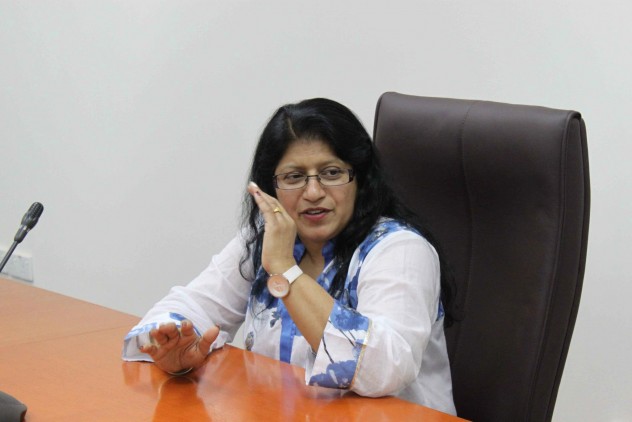“The bigger challenge was to get students interested in the subject matter motivated to do more than expected, and to (hopefully) leave a lasting impression.”
—Kalai Mathee, Ph.D., Teaching and Mentoring Statement
—Kalai Mathee, Ph.D., Teaching and Mentoring Statement

Medical Microbiology and Immunology - Herbert Wertheim College of Medicine
This course is for Graduate Certificate in Molecular and Biomedical Sciences students. This course introduces students to the general principles of infections, host immune responses, and the pathogen's evasion of these protections that are relevant for a foundation in clinical medicine. During the first three weeks of the course, an introduction to immunology, immune cells and organs will be provided along with an overview of the innate and adaptive immune systems. The course's remaining sessions will provide an overview of microbes (bacteria, viruses, fungi, and parasites) important to human disease, and their characteristics, disease processes, and treatment options. The discussion will also include evasion strategies used by pathogens against the antimicrobials, the immune response, antimicrobial therapies, and current clinical diagnostic tools and research techniques.
Molecular Microbiology and Infectious Diseases - Herbert Wertheim College of Medicine
This course is for Biomedical Sciences Graduate students. This course combines Immunology and Microbiology concepts to introduce students to the general principles of infections, host immune responses, and the pathogen’s evasion of these protections relevant to a foundation in clinical medicine. The students join the medical schools for the lectures, write a weekly summary of the lectures, review current literature. Students will provide a written review of three papers covering bacteria, viruses, and parasites, make an oral presentation, and submit three pathogen profiles.
Microbes, Infection and Immunology - Herbert Wertheim College of Medicine
This course is for MS1 students. The course is designed to introduce concepts and principles of immunology, medically relevant microbes (bacteria, viruses, prions, protozoa, fungi and parasites), as well as infection as a foundation for clinical medicine. The students will be introduced to the differences between Gram positive and negative bacteria, classes of viruses, prions, protozoa, fungi and parasites. Students will also discern subtleties between cellular and humoral responses, and how human immune responses may vary with different infections, as well as pathogen evasion strategies.
Prokaryotic Molecular Biology - University Graduate School, Florida International University
This course was developed for training Biology graduate students who will specialize in Molecular and Cellular Biology. This is part of a two-part core course series: MCB-I (PCB6025: Prokaryotic and Eukaryotic Molecular Biology) offered during the Fall term, and MCB-II (PCB6026: Cellular Biology and Protein Biochemistry), offered in the spring. The concept of this core course revolves around basic fundamental training in cell biology for graduate students. In fact, subsequent to launching this course, the department launched a policy under which M.S. students who earned A grades in these courses, and in BSC6457 (Introduction to Biological Research), may wave the comprehensive exam requirement. My portion covers replication, recombination, transcription, translation, and regulation of gene expression. Currently, these courses are also required for graduate students in Biomedical Engineering, which has resulted in an enrollment increase over time.
Prokaryotic Cloning (Workshop) - University Graduate School, Florida International University
This was another course targeted at students requiring a fundamental knowledge of cloning. Much of the practical information about cloning is not written in textbooks, but rather comes from extensive experience. I use a chalkboard format to teach this course, which includes 9 lectures under which bacterial strains, growth, properties, plasmids, vectors, and expression systems are covered. Additionally, polymerase chain reaction (PCR) and restriction/modification enzymes are highlighted areas of study. Each student is required to present a cloning paper: an article that describes construction of useful vectors. Lectures are usually followed by a week-long, rigorous round of hands-on experience.
Advanced Topics in Microbiology / Microbial Infectious Processes - University Graduate School, Florida International University
This course was codeveloped with the undergraduate course entitled ``Microbial Pathogenicity.`` The course has evolved over the years to the current form, in which graduate students are expected to attend every lecture and then choose 6-8 research paper critiques on different microbes.
Prokaryotic Signaling (Workshop) - University Graduate School, Florida International University
Most microbes have adapted a network of cell-to-cell communication strategies through extensive use of diffusible chemical compounds called quoromones (also known as autoinducers or acyl-homoserine lactones). This course is designed to teach students how to extract quoromones released by bacteria, as well as finding anti-quoromones. This course was only offered once.
Topics in Biology - University Graduate School, Florida International University
This course was aimed at intense discussion of recent publications with an emphasis on novel microbiological/molecular biology techniques. This course is offered every semester.
Microbial Pathogenicity, Department of Biological Sciences, Florida International University
This course is akin to Medical Microbiology, and covers the microbes that cause disease—however, the mechanisms, prevention, and possible treatments for infection are also discussed.
Genetics - Department of Biological Sciences, Florida International University
This is a core undergraduate Biology course I taught in the Spring of 2004. This was my first large class (54 students). After reading the textbook used by the department (Klugs, Cummings) in 2003, I switched the textbook to Concepts in Genetics by Benjamin Pierce. There was much effort that went into developing the course in order to provide students with a solid foundation in genetics.
Senior Seminar - Department of Biological Sciences, Florida International University
This is a core undergraduate Biology course I only taught once. It had three components: (1) how to find relevant scientific references; (2) how to develop a website; and (3) how to prepare and present a proper presentation.